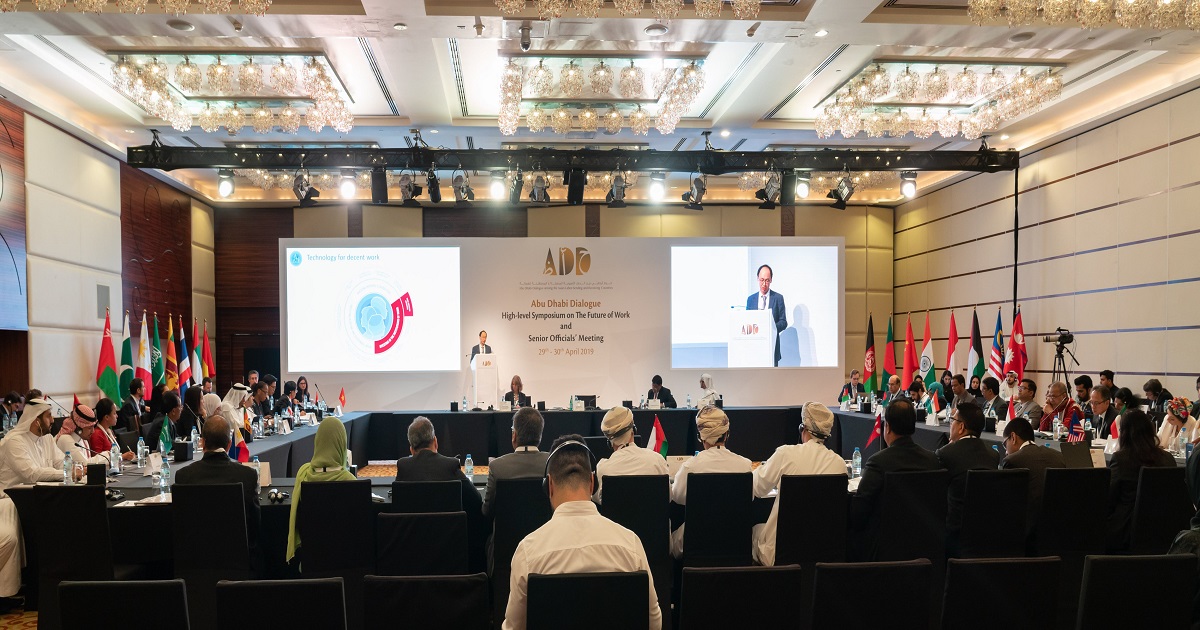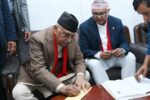KATHMANDU: The Fifth Ministerial Consultation of Abu Dhabi Dialogue is taking place in the United Arab Emirates (UAE) on October 16-17.
Minister for Labor, Employment and Social Security Gokarna Bista is taking part in the inter-governmental forum representing Nepal.
The Sixth Ministerial Consultation of the Colombo Process held in Kathmandu one year ago had adopted a 27-point Kathmandu Declaration.
Participating countries had urged the employment providing countries to adopt a one door-policy to ensure that migrant workers will enjoy pay perks in line with international standards.
A total of 12 countries in the declaration had agreed to accept the standards set by the International Labor Organization (ILO) and International Labor Act.
The members of the Colombo Process include China, India, Cambodia, Pakistan, Afghanistan, Bangladesh, Indonesia, Philippines, Sri Lanka, Thailand, and Vietnam. This forum has been working in collaboration with the Global Compact for Migration (GCM).
Participating countries had urged the employment providing countries to adopt a one door-policy to ensure that migrant workers will enjoy pay perks in line with international standards.
“Nepal is committed to supplying Nepali workers only after inking a labor deal with the concerned countries as per the spirit and objectives of the Regional Mechanism for Migration and Good Governance,” said Bista.
The issues raised in the Colombo Process have been already submitted in the Abu Dhabi Dialogue – a forum of employment providing countries.
The Dialogue has been stressing skilled manpower. But, interestingly, the supply of unskilled manpower has gone unabated.
On the other hand, labor supplying countries have been maintaining that right even of semi-skilled or unskilled manpower should be ensured.
Employment providing companies have maintained that the service fee incurred will be as per the companies’ rules while the labor supplying countries have demanded that the service fee should be borne by the employment providing countries themselves.
All the countries associated with the Colombo Process should join hands for salary, human rights, and security issues, said Laxman Basnet, general secretary of the South Asian Regional Trade Union Council.
What does the Kathmandu Declaration say?
The issues raised by the Colombo Process will come into operation once they are addressed by the Dialogue. Member states of the Colombo Process are optimistic that the Dialogue will address their demands.
Similarly, the Colombo Process Declaration has stated that the labor agreement should be inked at the government level and that the human rights of the migrant worker be guaranteed.
The GCM has been addressing issues subsisting between the employment providing countries and labor supplying countries. It has assured that it will discuss the issues raised by the member states of the Colombo Process.
The earlier meeting of the Abu Dhabi Dialogue had dwelled on the skills and efficiency of the migrant workers. However, no significant changes have taken place regarding the interest and the rights of the migrant workers.
Employment expert Dipendra Thapa suggests that the member states of the Colombo Process should stand united for the interest and the rights of the migrant workers. “The issues raised by the member states of the Colombo Process will have a far-reaching impact. They should be serious regarding this issue,” said Thapa.
Countries participating in Abu Dhabi Dialogue
The Abu Dhabi Dialogue, established in 2008, includes Australia, Malaysia, Switzerland, Bahrain, Qatar, United Arab Emirates (UAE), Italy, South Korea, Britain, USA, Saudi Arab, and Kuwait as member states.
They have been marinating that issues such as insurance, training, and security of migrant workers should be as per the companies’ rules.
Almost 35 million people leave their countries (member states of the Colombo Process) for foreign employment annually.
According to a report of the Colombo Process, around 50 to 60 percent of migrant workers are unskilled for which they are facing discrimination.
The manpower supplied from India, China, Philippines, Thailand, Cambodia, and Indonesia to third countries is usually skilled while those supplied through Nepal, Sri Lanka, Pakistan, Afghanistan, Bangladesh, and Vietnam are unskilled.









Comment